You are using an out of date browser. It may not display this or other websites correctly.
You should upgrade or use an alternative browser.
You should upgrade or use an alternative browser.
Diego Maradona - He's Not Dead
- Thread starter Bradley
- Start date
- Latest activity Latest activity:
- Status
- Not open for further replies.
More options
Who Replied?Not sure, don't think it's on UK Netflix. It's by the same guy who made Senna if that helps.Is this the one that's also on Netflix, or is it a different one?
Ah, it must be a different one. The one on Netflix is about him managing a team in Mexico.Not sure, don't think it's on UK Netflix. It's by the same guy who made Senna if that helps.
Apparently they had a film crew on him from early in his career in order to make a documentary that never got made, until this dude got permission to use it.The all 4 one is quality. The footage is ace and no silly voice over.
Apparently they had a film crew on him from early in his career in order to make a documentary that never got made, until this dude got permission to use it.
That would make sense as the footage is unbelievable. You can see the context for Some of the famous photos of Diego
The same director is a big LFC fan.
The director of the acclaimed Diego Maradona documentary on the Argentina legend and his love of Liverpool

@SachinNakrani
Tue 14 Apr 2020 21.00 BSTLast modified on Wed 15 Apr 2020 09.12 BST
Shares
84
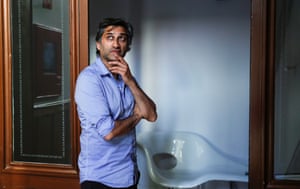
Asif Kapadia, pictured in Spain last year, has described the positive reaction his documentary on Diego Maradona received when shown on Channel Four recently as a ‘ great feeling’. Photograph: epa07706137/EPA-EFE
For most of us it feels like a lifetime ago but just over three weeks have passed since the UK went into social lockdown. Friday 20 March to be precise – the day it was announced all cafes, pubs and restaurants had to shut because of coronavirus and everyone in the country realised they were in for many, many nights stuck in front of the television.
So began the search for things to watch and for football lovers quick relief came on that first Saturday when Channel Four showed Diego Maradona, the critically acclaimed documentary by director Asif Kapadia. I’d seen it at a screening in central London 10 months earlier and found myself nodding in agreement as praise for the film filled social media. Kapadia witnessed the outpouring too and even for a man who has been there, done that and got the Oscar, there was satisfaction to be taken from the way his work was being received.
“Looking at Twitter from my sofa it felt like a lot of people were watching the film, and a lot of people I respect. So that was a great feeling,” he says. “It was actually a complete coincidence Channel Four showed the film on the first Saturday after the pubs shut, and as ever I was one of the last people to find out.”
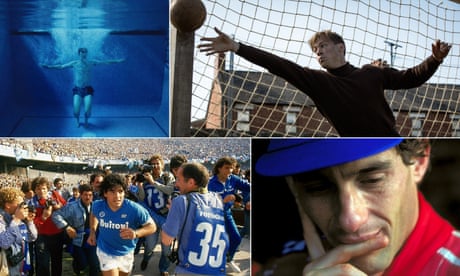
Missing live sport during lockdown? Here are 12 sporting films to watch
Read more
Kapadia delivers that last line with a laugh, which is in keeping with his mood as we speak – like many are doing right now – via WhatsApp.
These are strange times but the 47-year-old is coping well, partly because he is used to working from home and partly because of the sense of perspective he is able to maintain while in isolation with his wife and two children. “We have a home, food, hot water and a garden,” Kapadia says. “Compared to a lot of people we’re lucky.”
Football Weekly
Italy v Brazil 1982: Paolo Rossi, samba skills and classic kits
00:00:00
00:47:51
Advertisement
His frustration is instead directed towards the government, which will come as no surprise to anyone who follows Kapadia on Twitter. He is politically outspoken and does not hold back when assessing how the current crisis is being managed. “I’ve felt for years that the Tories have not looked after the NHS, not properly funded it, and nothing they are doing right now has changed my mind. I hope people remember this the next time they vote.”
This is a theme Kapadia will touch on again later but for now our conversation shifts back to Diego Maradona, the director’s seventh feature film and third documentary following Senna, which focuses on the life and death of Formula One legend Ayrton Senna, and Amy, which tells the tragic story of singer Amy Winehouse and for which Kapadia won his Oscar in 2016.
For Maradona he deployed the same archive techniques and again produced something brilliant. An intense, captivating biography centred on the seven years Maradona spent at Napoli, a period that took in two World Cups and during which the Argentinian’s myth and legend – for better and worse – was established. It is all there in the film, starting with a sequence showing cars hurtling through the streets of Naples en route to Maradona’s unveiling at the Stadio San Paolo in July 1984 that is as thrilling as it is apt.
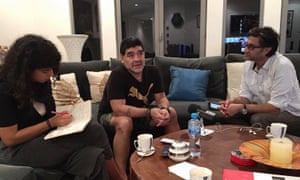
FacebookTwitterPinterest
Asif Kapadia speaks with Diego Maradona at the Argentinian’s home in Dubai. Lina Caicedo, a Spanish language producer on the documentary, takes notes. Photograph: Courtesy of Asif Kapadia
“With Maradona you have this guy who is God or the devil depending on your opinion. He’s not in the middle, he’s extreme, and people like that cannot help but be interesting,” Kapadia says. “The point of the film is to say ‘just watch him’, and even if you hate him you can’t deny he was amazing.
“I love the opening sequence – it’s the very essence of Maradona’s life. One of my other favourite scenes is the one of him at Napoli’s Christmas party, after the [1990] World Cup. No one talks to him and he doesn’t talk to anyone, the shot holds for ages and you just know he’s going through a lot. It’s really powerful.”
Kapadia spent nine hours interviewing Maradona before making the documentary, speaking with him at his home in Dubai and elsewhere. The experience allowed him to develop an unusually rounded view of someone who, post-retirement, has taken on a rather grotesque persona.
“It’s rare you have direct access to someone like Maradona – you’re always going via other people. So you get annoyed with the guy but it’s the entourage who play a big part in how he comes across,” Kapadia says. “In the time I spent with Maradona I got to see he has good days and bad days, like most people.”
Play Video
2:08
Diego Maradona documentary: official trailer – video
And has he seen the film? “Anyone else, if there was a film about them you know they would have by now, but this being Maradona, he’s decided he’s not going to watch it,” Kapadia replies with another laugh. “I think he probably has.”
Advertisement
The son of Indian immigrants, Kapadia was born and raised in Hackney, east London. He found his calling in the visual arts in his early 20s. It was perhaps inevitable he would make a film about football given one of his earliest memories is watching the 1978 World Cup final between Argentina and the Netherlands on television.
Kapadia also played football as a child and, during that time, developed a love for a club that endures to this day. “I come from a family of Arsenal fans and for my first game, my brother took me to Highbury to watch Arsenal versus Liverpool,” he says. “I was with the Arsenal fans and Arsenal won but I felt nothing for them – it was all about Liverpool.
“I supported them because my best mate did. Neither of us even knew where Liverpool was but it was the 1970s and back then we weren’t even allowed out of our road.”
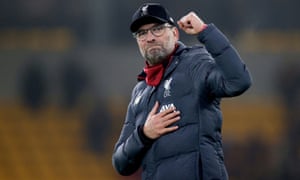
FacebookTwitterPinterest
‘I think Jürgen Klopp is a man of faith,’ says Asif Kapadia of the Liverpool manager. Photograph: Carl Recine/Action Images via Reuters
This leads to a discussion about the incredible season Liverpool were experiencing and to the man who has brought joy and hope back to the supporters – Jürgen Klopp. “I love him,” Kapadia says. “He is honest, passionate and genuinely cares. Whenever I hear him speak I think: ‘Why can’t we have politicians like that?’”
“I have a theory on Klopp,” Kapadia continues. “I think he’s a man of faith. I know from my own background that believing in God doesn’t have to be an awful thing – it can be really interesting and get you through difficult times, and I see that in Jürgen.
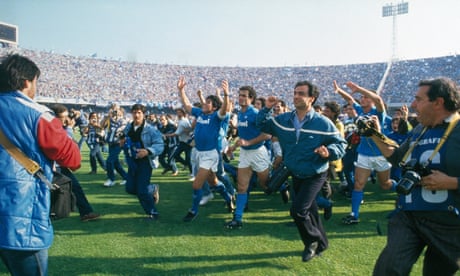
Buy a classic sport photograph: Maradona, the 'God of Naples'
Read more
“To stress – I don’t know this for sure. But it would explain how he has lost as many finals as he has and never whinged, or how he is able to see the bigger picture right now. Honestly, if Jürgen turned around and said: ‘I don’t care about the league, there’s more important things to worry about,’ I’d follow him.”
All of which begs an obvious question – would Kapadia ever consider making a film about Liverpool, and Klopp in particular? “I like having Liverpool as my hobby and when your hobby becomes work it can be difficult,” he replies.
“What’s for sure is one day, when he’s won 15 trophies for us and retired, I’d love to sit down with Klopp. He’s complex, has had a really interesting journey, and is incredibly charismatic. I’d love to dig into his brain.”
The director of the acclaimed Diego Maradona documentary on the Argentina legend and his love of Liverpool

@SachinNakrani
Tue 14 Apr 2020 21.00 BSTLast modified on Wed 15 Apr 2020 09.12 BST
Shares
84

Asif Kapadia, pictured in Spain last year, has described the positive reaction his documentary on Diego Maradona received when shown on Channel Four recently as a ‘ great feeling’. Photograph: epa07706137/EPA-EFE
For most of us it feels like a lifetime ago but just over three weeks have passed since the UK went into social lockdown. Friday 20 March to be precise – the day it was announced all cafes, pubs and restaurants had to shut because of coronavirus and everyone in the country realised they were in for many, many nights stuck in front of the television.
So began the search for things to watch and for football lovers quick relief came on that first Saturday when Channel Four showed Diego Maradona, the critically acclaimed documentary by director Asif Kapadia. I’d seen it at a screening in central London 10 months earlier and found myself nodding in agreement as praise for the film filled social media. Kapadia witnessed the outpouring too and even for a man who has been there, done that and got the Oscar, there was satisfaction to be taken from the way his work was being received.
“Looking at Twitter from my sofa it felt like a lot of people were watching the film, and a lot of people I respect. So that was a great feeling,” he says. “It was actually a complete coincidence Channel Four showed the film on the first Saturday after the pubs shut, and as ever I was one of the last people to find out.”

Missing live sport during lockdown? Here are 12 sporting films to watch
Read more
Kapadia delivers that last line with a laugh, which is in keeping with his mood as we speak – like many are doing right now – via WhatsApp.
These are strange times but the 47-year-old is coping well, partly because he is used to working from home and partly because of the sense of perspective he is able to maintain while in isolation with his wife and two children. “We have a home, food, hot water and a garden,” Kapadia says. “Compared to a lot of people we’re lucky.”
Football Weekly
Italy v Brazil 1982: Paolo Rossi, samba skills and classic kits
00:00:00
00:47:51
Advertisement
His frustration is instead directed towards the government, which will come as no surprise to anyone who follows Kapadia on Twitter. He is politically outspoken and does not hold back when assessing how the current crisis is being managed. “I’ve felt for years that the Tories have not looked after the NHS, not properly funded it, and nothing they are doing right now has changed my mind. I hope people remember this the next time they vote.”
This is a theme Kapadia will touch on again later but for now our conversation shifts back to Diego Maradona, the director’s seventh feature film and third documentary following Senna, which focuses on the life and death of Formula One legend Ayrton Senna, and Amy, which tells the tragic story of singer Amy Winehouse and for which Kapadia won his Oscar in 2016.
For Maradona he deployed the same archive techniques and again produced something brilliant. An intense, captivating biography centred on the seven years Maradona spent at Napoli, a period that took in two World Cups and during which the Argentinian’s myth and legend – for better and worse – was established. It is all there in the film, starting with a sequence showing cars hurtling through the streets of Naples en route to Maradona’s unveiling at the Stadio San Paolo in July 1984 that is as thrilling as it is apt.

FacebookTwitterPinterest
Asif Kapadia speaks with Diego Maradona at the Argentinian’s home in Dubai. Lina Caicedo, a Spanish language producer on the documentary, takes notes. Photograph: Courtesy of Asif Kapadia
“With Maradona you have this guy who is God or the devil depending on your opinion. He’s not in the middle, he’s extreme, and people like that cannot help but be interesting,” Kapadia says. “The point of the film is to say ‘just watch him’, and even if you hate him you can’t deny he was amazing.
“I love the opening sequence – it’s the very essence of Maradona’s life. One of my other favourite scenes is the one of him at Napoli’s Christmas party, after the [1990] World Cup. No one talks to him and he doesn’t talk to anyone, the shot holds for ages and you just know he’s going through a lot. It’s really powerful.”
Kapadia spent nine hours interviewing Maradona before making the documentary, speaking with him at his home in Dubai and elsewhere. The experience allowed him to develop an unusually rounded view of someone who, post-retirement, has taken on a rather grotesque persona.
“It’s rare you have direct access to someone like Maradona – you’re always going via other people. So you get annoyed with the guy but it’s the entourage who play a big part in how he comes across,” Kapadia says. “In the time I spent with Maradona I got to see he has good days and bad days, like most people.”
Play Video
2:08
Diego Maradona documentary: official trailer – video
And has he seen the film? “Anyone else, if there was a film about them you know they would have by now, but this being Maradona, he’s decided he’s not going to watch it,” Kapadia replies with another laugh. “I think he probably has.”
Advertisement
The son of Indian immigrants, Kapadia was born and raised in Hackney, east London. He found his calling in the visual arts in his early 20s. It was perhaps inevitable he would make a film about football given one of his earliest memories is watching the 1978 World Cup final between Argentina and the Netherlands on television.
Kapadia also played football as a child and, during that time, developed a love for a club that endures to this day. “I come from a family of Arsenal fans and for my first game, my brother took me to Highbury to watch Arsenal versus Liverpool,” he says. “I was with the Arsenal fans and Arsenal won but I felt nothing for them – it was all about Liverpool.
“I supported them because my best mate did. Neither of us even knew where Liverpool was but it was the 1970s and back then we weren’t even allowed out of our road.”

FacebookTwitterPinterest
‘I think Jürgen Klopp is a man of faith,’ says Asif Kapadia of the Liverpool manager. Photograph: Carl Recine/Action Images via Reuters
This leads to a discussion about the incredible season Liverpool were experiencing and to the man who has brought joy and hope back to the supporters – Jürgen Klopp. “I love him,” Kapadia says. “He is honest, passionate and genuinely cares. Whenever I hear him speak I think: ‘Why can’t we have politicians like that?’”
“I have a theory on Klopp,” Kapadia continues. “I think he’s a man of faith. I know from my own background that believing in God doesn’t have to be an awful thing – it can be really interesting and get you through difficult times, and I see that in Jürgen.

Buy a classic sport photograph: Maradona, the 'God of Naples'
Read more
“To stress – I don’t know this for sure. But it would explain how he has lost as many finals as he has and never whinged, or how he is able to see the bigger picture right now. Honestly, if Jürgen turned around and said: ‘I don’t care about the league, there’s more important things to worry about,’ I’d follow him.”
All of which begs an obvious question – would Kapadia ever consider making a film about Liverpool, and Klopp in particular? “I like having Liverpool as my hobby and when your hobby becomes work it can be difficult,” he replies.
“What’s for sure is one day, when he’s won 15 trophies for us and retired, I’d love to sit down with Klopp. He’s complex, has had a really interesting journey, and is incredibly charismatic. I’d love to dig into his brain.”
- Status
- Not open for further replies.

